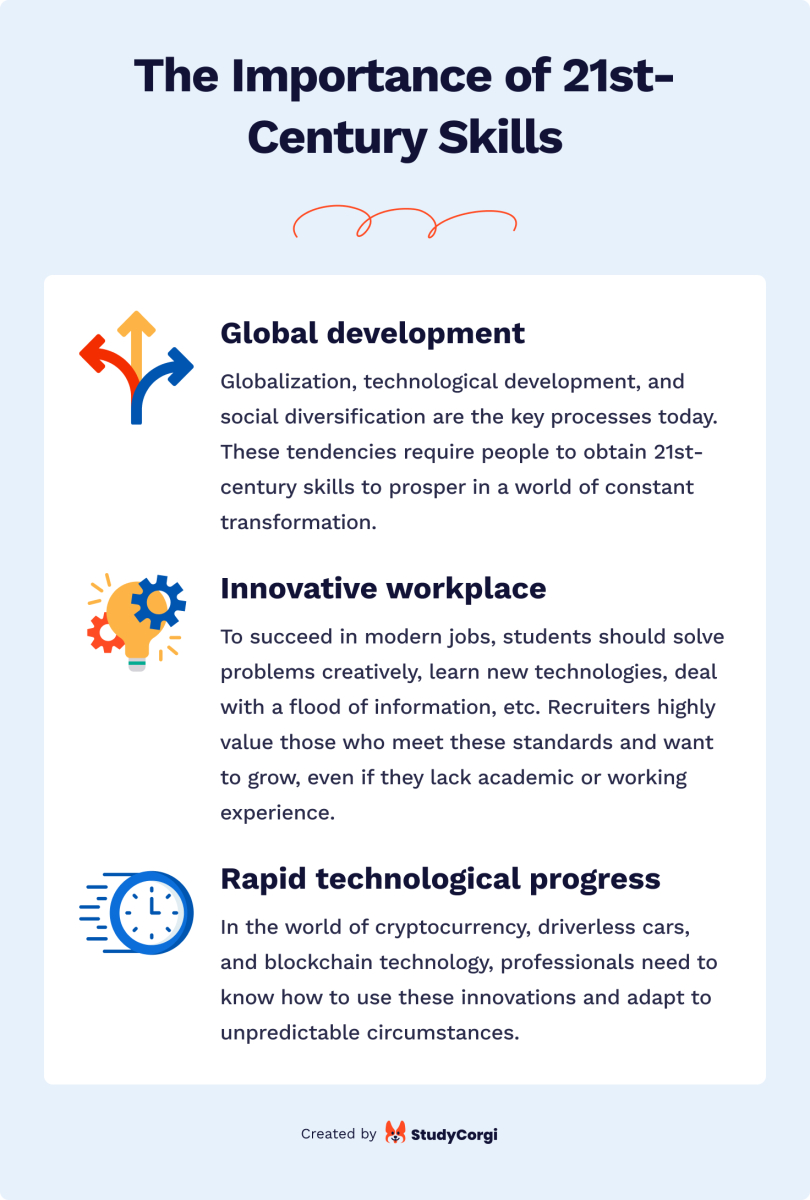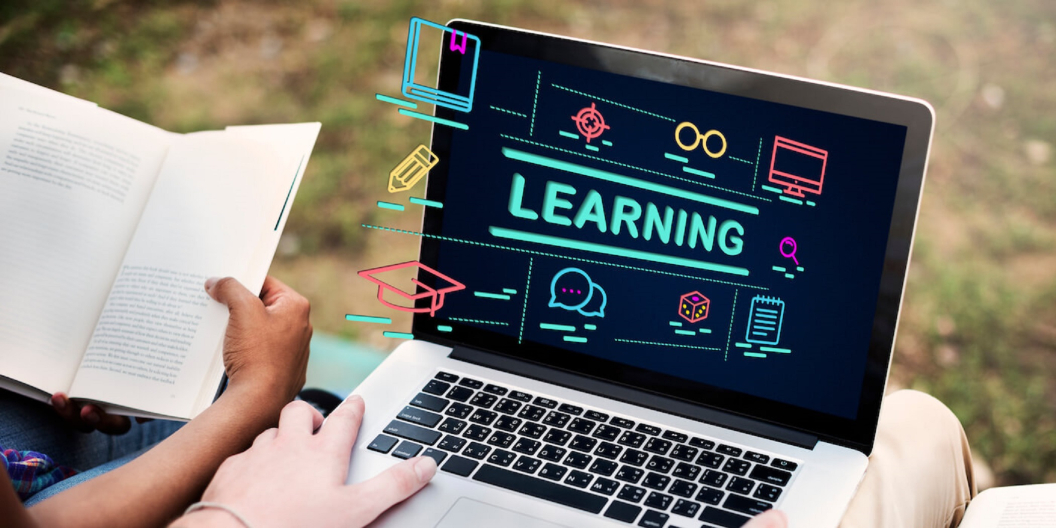21st-century skills are abilities and competencies considered indispensable for thriving in the contemporary world. Some of them are critical thinking, teamwork, creativity, and technology literacy. However, what exactly are those super skills, and how can you master them?
In this article, we’ll discuss why 21st-century skills are important and how they can benefit your studies, interpersonal communication, and self-development. We’ll also regard the key areas and categories of 21st-century skills: education and learning, information literacy, and life skills.
Read on to learn more on the topic!
🌐 What Are 21st-Century Skills?
So, what are 21st-century skills? They encompass a broad set of knowledge, habits, and character traits that educators and employers find essential to flourish in today’s world. These qualities comprise critical thinking, collaboration, leadership, and other abilities needed in collegiate programs and modern workplaces.
21st-Century Learning
The role of 21st-century education is to help every student learn how to learn. Modern learning encourages collaboration, inspires creativity, and rewards critical thinking. It teaches students how to make sense of the never-ending flow of information and use it wisely. By providing students with these fundamental abilities, 21st-century education helps them thrive in the workplace.
Here are some critical features of 21st-century learning:
- It aims to develop creativity in students. The more complex the world becomes, the more creative solutions people need to overcome its challenges.
- It is highly individual. In modern society, people value individuality and authenticity. 21st-century education seeks a unique approach for every student.
- It uses technologies. Books used to be the primary source of information for people. However, nowadays, you can develop 21st-century skills with the help of workshops, online courses, and even YouTube.
- It highly values students’ progress. A 21st-century education isn’t about making students memorize information to get an A+ on their assignments. Modern learning systems adhere to the idea that average standardized scores shouldn’t measure a student’s success.
Why Are 21st-Century Skills Essential?
The modern world is characterized by globalization, rapid technological development, and social diversity, making 21st-century skills more essential to students than ever. These processes require educators to create a framework for successful studying methods and to ensure young people can prosper in a world of constant transformation. Opportunities for 21st-century students are also expanding. They include international study programs, global knowledge exchanges, and projects organized by companies with the possibility of obtaining a job, etc.
The 21st-century workplace has also become more innovative and competitive. To succeed in modern information-age jobs, students need to solve problems creatively, work in teams, communicate on social media, learn to use new technologies, and deal with a flood of information. Top managers highly value employees who can meet these standards and have the energy to expand their skills, even if they lack some academic or working experience. Hence, 21st-century skills have become a must for anyone who wants a well-paying job in a modern company.

Who Needs These Skills?
The 21st century has experienced significant economic changes and breakthrough discoveries. We now have cryptocurrency, driverless cars, and blockchain technology, among other inventions. And with these innovations, we need to learn: 1) how to use them and 2) how to adapt to unpredictable circumstances.
21st-century skills are essential for high-school and college students just now entering the corporate world. Numerous new careers are appearing in today’s labor market: for example, cybersecurity experts, SMM specialists, and many others. New professions, as well as the jobs of the future, are full of unknown challenges. Consequently, employers seek creative and observant candidates with skills to deal with unpredictable aspects of work. So, our advice is to prepare yourself for new technologies and careers that might not yet exist.
🤝 21st-Century Skills – Main Types
Usually, experts divide 21st-century competencies into 3 types: learning skills, life skills, and digital literacy. These categories contain hard and soft skills that help workers adapt to changes and trends. Let’s consider each group in more detail.
1. Learning Skills
Modern learning involves much more than memorizing material before an exam. Instead, it is a life-long journey where every new experience can turn into an insightful lesson. Skills falling into this category are often called the 4C’s: critical thinking, creativity, collaboration, and communication. They enable a person to grow and change.
- Critical thinking
Critical thinking is essential to achieve success in business and science. It allows you to think outside the box and formulate your ideas. - Creativity
Creativity is vital to innovation. Creative thinkers see things from unusual angles, which allows them to find unconventional solutions to complicated tasks. - Collaboration
Collaboration might be the most challenging skill to master among the 4 C’s. However, once you learn to work with others, you can compromise and obtain the best results from teamwork. - Communication
Effective communication is indispensable for building lifelong connections with other people. Employers highly value good communicators who can approach individuals with different personality types.
2. Digital & Information Literacy Skills
Social media and technology have become inherent in almost every aspect of contemporary life. Therefore, people must possess the skills necessary to create and share information. The top three 21st-century digital competencies are:
- Information literacy
Information literacy means finding, assessing, organizing, and using information in multiple formats. It also enables people to differentiate facts from fiction. Nowadays, finding valuable and truthful information can be a real challenge since the Internet abounds with misleading content. - Media literacy
The amount of time people spend online has considerably risen over the past decade, making media literacy a paramount skill. It strengthens your ability to analyze, create, and interact with online messages and sources. It also lets people find the most effective methods of creating and sharing information. - Technology literacy
Technology literacy is a hard skill connected with computers, cloud computing, and mobile devices. Once you master it, you’ll understand how gadgets work and get the chance to work as a data scientist.
3. Life Skills
Life skills allow for finding novel ways of thinking and problem-solving and developing greater self-awareness. Students often do their best to improve their grades, but many still struggle to gain this set of skills. Meanwhile, employers consider life skills just as necessary as academic performance. So, these competencies give you a significant advantage when applying for a job.
Consider these examples of life skills:
- Flexibility
Flexibility is someone’s ability to adapt to changes and the unknown. Many people find it hard to adjust to new circumstances and people. However, flexibility is essential for long-term success in your career and personal life. - Leadership
Leadership is a vital skill for entrepreneurs and everyone who aims to achieve their goals. Leading a team can be stressful, but good leaders are highly valued in all situations. - Social skills
Networking has never been more significant than in today’s world. Effective communication, empathy, and active listening can significantly contribute to success.

🛎️ The Ultimate List of 21st-Century Skills – 2026
The list of 21st-century skills goes beyond the categories discussed above. Most of them are universal and can benefit various aspects of your life. However, others can be applied to specific spheres like business, politics, or science.
Here is the extended list of top 21st-century skills.
- Cultural literacy.
- Global awareness.
- Creative thinking.
- Adaptability.
- Presentation skills.
- Curiosity.
- Risk management.
- Cooperation.
- Time management.
- Problem-solving.
- Self-direction and social responsibility.
- Oral and written communication.
- Planning and time management.
- Teamwork.
- Leadership.
- Active listening.
- Initiative.
- Ethics.
- Networking.
- Stress management.
- Decision-making.
- Willingness to learn.
- Punctuality.
- Sense of style.
- Negotiation skills.
- Media literacy.
- Multitasking.
- Emotional intelligence.
- Delegation.
- Deductive and inductive reasoning.
- Attention to detail.
- Storytelling.
- Motivation and support.
- Logical thinking.
- Prioritizing.
- Technical literacy.
- Positive attitude.
- Project management.
- Engagement.
- Self-reflection.
- Stress resistance.
- Dealing with new media.
- Analytical skills.
- Confidence.
- Language knowledge.
- Improvisation.
- Self-management.
- Situational awareness.
- Assertiveness.
👩💻 How to Develop 21st-Century Skills
Not all schools and colleges teach students contemporary skills. Luckily, there are several ways you can master these competencies yourself. Consider these tips if you want to boost your 21st-century skillset and become the best version of yourself.
- Prioritize the skill you want to develop. It’s better to advance in your learning process step-by-step. Focus on one skill at a time to master it. You will need to spend time on research and practice.
- Ask others for feedback. Self-reflection can be challenging for some people since we are usually not our best judges. It’s a great idea to ask your friends, classmates, or colleagues to highlight your strengths and weaknesses.
- Step outside your comfort zone. New experiences can bring the most valuable life lessons. Say “yes” to the opportunities appearing on your way if you want to discover new things about yourself.
- Stay aware of new technologies and media. Using different kinds of media and technologies can significantly improve your digital literacy. Luckily, plenty of courses are available online.
- Take leadership positions. At first, you might feel pressure, but your confidence will grow over time. Taking a leadership position, even temporarily, will boost your interpersonal and management skills.
📍 Conclusion
21st-century skills focus on what it is like to live, study, and work in today’s society. They prepare people to take on any challenges they might face in the future. Such skills are a great advantage when applying for college or a job. Besides, they can significantly benefit your academic performance.
There is no doubt that 21st-century skills are essential for everyone, and fortunately, there are plenty of ways to develop them. Our final advice is to regularly go out of your comfort zone and take all the opportunities available to challenge yourself. Remember that learning is a life-long journey!
